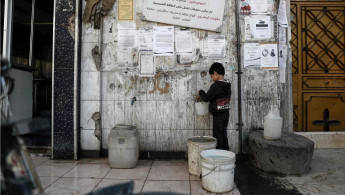Impoverished citizens in Damascus are contracting medieval diseases from the water supply
Suleiman, 20, told The New Arab that doctors examined his father and confirmed he had contracted amoebic dysentery - a disease more commonly associated with medieval times than the present day. Dysentery affects the intestinal walls, leading to infections and even death.
The news hit the Suleiman family by surprise - as the family had installed an expensive water-filtration system only five months previous. The water filter was designed to keep their water supply safe and secure, yet the medical analysis showed the cause to be unclean water.
Doctors pointed to seven similar documented cases where filtered water drinkers had contracted dysentery - but what had gone wrong with the filters themselves?
Purified, yet contaminated
Damascus, the capital of Syria, relies on two sources of drinking water. The largest supply - responsible for around 70 percent - is a natural spring in the town of Ain al-Fijah, located around 25km northwest of Damascus. This supply was temporarily cut in December last year, after Syrian rebels captured the town. Four million people in Damascus experienced restricted access to mains water due to waterpipe damage as a result.
| Read more: Inside Douma: A desperate portrait of life in Syria |
The water that comes from this town is particularly 'hard' - in that it contains a high percentage of calcium carbonate, causing a buildup of limescale over time.
This limescale builds up inside the filter itself - creating the perfect habitat for water to grow stagnant - and bacteria colonies to grow.
Ignorance
Basel Deeb owns his own doctors' clinic in the neighbourhood of Dwel'a, located near the Jaramana refugee camp, south-east Damascus.
He says he attended to at least 14 patients who have become ill from drinking contaminated tap water in only the first three months of 2017. As a result of these cases, Deeb only allows his family to drink mineral water for fear of getting sick.
Many of Damascus' water filters are sold in Marja square, where a typical filter is sold for around 60,000 Syrian pounds ($120). A top-range filter, providing microbial and chemical purification through a four-stage process, can be bought for around 150,000 Syrian pounds [$300].
Yet even with these microbial filters, Deeb argues, bacteria can start to multiply in the chambers as they become perfect sites for a colony to grow in. Water that is then pushed through this contaminated filter travels through a bacterial colony - and the filter becomes a source of dirty water, not a prevention against it.
Water filter sellers import their products from China and tell their customers to change them every six months. Yet Deeb told The New Arab that the filters actually needed changing twice every month - a fact that is not widely known.
Priced out
For many Syrian families - hit hard by the economic realities of six punishing years of civil war and the devastating inflation that followed - there is but little alternative to drink the tap water.
The Syrian pound has lost anywhere up to 90 percent of its value since the war began, meaning that basic household necessities have become more and more difficult to buy.
Before the war, ten litres of water could be bought for only SYP50, a tiny fraction of today's price. Today, six 1.5 litre bottles of tap water are selling for around SYP1000 [$2], while the average monthly salary in Syria is between SYP30,000 and SYP50,000 [$60-$100].
Twitter Post
|
Out with the good, in with the bad
Yet, even if the majority of citizens changed their filters far more regularly [at great additional cost], it might still not be enough to protect everyone.
Mineral water contains vital minerals and salts that are equally important to maintain a healthy diet. According to one water engineer however, these elements are actually being removed by the water filters. Mineral-free water makes the water much more acidic - and can even destroy the metal containers it's held in.
Mineral-free water has been linked to a number of dangerous diseases, including osteoporosis, osteoarthritis, hypothyroidism, heart disease and high blood pressure.
And once the minerals are removed, they accumulate inside the filter over time - creating dark-coloured, murky water if the filters aren't changed regularly.
"I was amazed when I saw this darkened filtered water coming out the tap," said Yasser Khatib, a resident in the Jaramana neighbourhood of Damascus.
"I know this water from Ain al-Fijeh is already clean - it's one of the sweetest springs of the Arab world."



